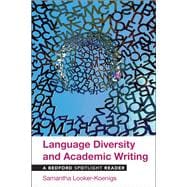
Note: Supplemental materials are not guaranteed with Rental or Used book purchases.
Purchase Benefits
Looking to rent a book? Rent Language Diversity and Academic Writing A Bedford Spotlight Reader [ISBN: 9781319055097] for the semester, quarter, and short term or search our site for other textbooks by Looker-Koenigs, Samantha. Renting a textbook can save you up to 90% from the cost of buying.
About the Bedford Spotlight Reader Series
Preface for Instructors
Contents by Discipline
Contents by Theme
Contents by Rhetorical Purpose
Introduction for Students
Chapter One: How Does Language Reflect Who We Are?
Lee Romney, Revival of Nearly Extinct Yurok Language Is a Success Story
Louise Erdrich, Two Languages in Mind, but Just One in the Heart
Amy Tan, Mother Tongue
Gloria Anzaldúa, How to Tame a Wild Tongue
Susan Tamasi and Lamont Antieau, Social Variables
Connie Eble, from Slang and Sociability: In-Group Language among College Students
H. Samy Alim, Hip Hop Nation Language
Chapter Two: How Does Language Affect How Others Perceive Us?
Marybeth Seitz-Brown, Young Women Shouldn’t Have to Talk Like Men to Be Taken Seriously
Dennis Preston, Some Plain Facts about Americans and Their Language
Cheryl J. Boucher, Georgina S. Hammock, Selina D. McLaughlin, and Kelsey N. Henry, Perceptions of Competency as a Function of Accent
Carmen Fought, Are White People Ethnic? Whiteness, Dominance, and Ethnicity
John McWhorter, Straight Talk: What Harry Reid Gets about Black English
Rusty Barrett, Rewarding Language: Language Ideology and Prescriptive Grammar
Kathryn Campbell-Kibler, Intersecting Variables and Perceived Sexual Orientation in Men
Chapter Three: How Does Language Change (Whether We Like It or Not)?
Mark Peters, He Said, Sheme Said
Tom Chatfield, OMG—It’s the Textual Revolution
Naomi S. Baron, Are Digital Media Changing Language?
Douglas Quenqua, They’re, Like, Way Ahead of the Linguistic Currrrve
Edwin L. Battistella, Slang as Bad Language
Robert MacNeil, English Belongs to Everybody
Erin McKean, How Are Dictionaries Made?
Robert MacNeil and William Cran, The Language Wars
Rosina Lippi-Green, The Standard Language Myth
Chapter Four: What Do We Do When We Write?
Kevin Roozen, Writing Is a Social and Rhetorical Activity
Kevin Roozen, Writing Is Linked to Identity
Paul Kei Matsuda, Writing Involves the Negotiation of Language Differences
Peter Elbow, Speaking and Writing
Susan Wyche, Time, Tools, and Talismans
Mike Rose, Rigid Rules, Inflexible Plans, and the Stifling of Language
Carie Gauthier, Metaphors in the Writing Process of Student Writers (student essay)
Chapter Five: What Does It Mean to Write "Academically"?
Dan Berrett, Students Come to College Thinking They’ve Mastered Writing
Chris Thaiss and Terry Myers Zawacki, What Is Academic Writing? What Are Its Standards?
Susan E. Schorn, A Lot Like Us, but More So: Listening to Writing Faculty Across the Curriculum
J. Paul Johnson and Ethan Krase, Writing in the Disciplines: A Case Study of Two Writers
Paul Kei Matsuda, The Image of College Students and the Myth of Linguistic Homogeneity
Helen Fox, Worldwide Strategies for Indirection
Vershawn Ashanti Young, The Problem of Linguistic Double Consciousness
Nancy Sommers and Laura Saltz, Writing that Matters: A Paradigm Shift
Anne E. Whitney, "I Just Turned In What I Thought": Authority and Voice in Student Writing
The New copy of this book will include any supplemental materials advertised. Please check the title of the book to determine if it should include any access cards, study guides, lab manuals, CDs, etc.
The Used, Rental and eBook copies of this book are not guaranteed to include any supplemental materials. Typically, only the book itself is included. This is true even if the title states it includes any access cards, study guides, lab manuals, CDs, etc.